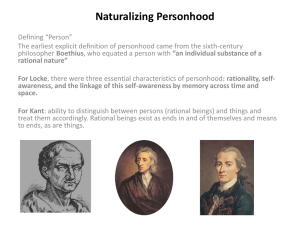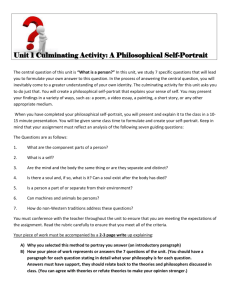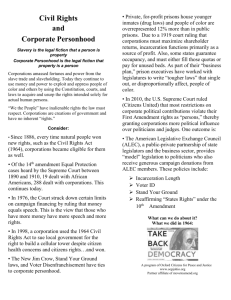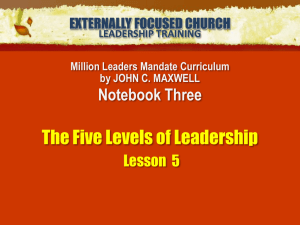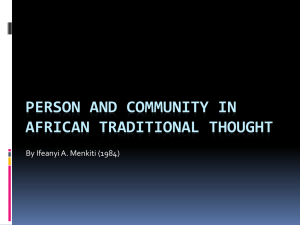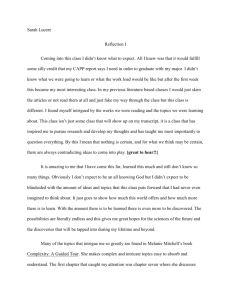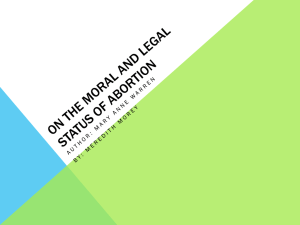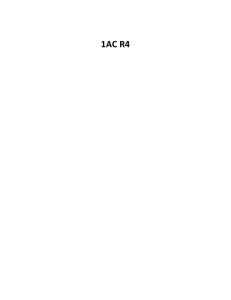Iara Cury Week#6, Elizabeth Ewart 23/02/2011 Identity, Self, and
advertisement
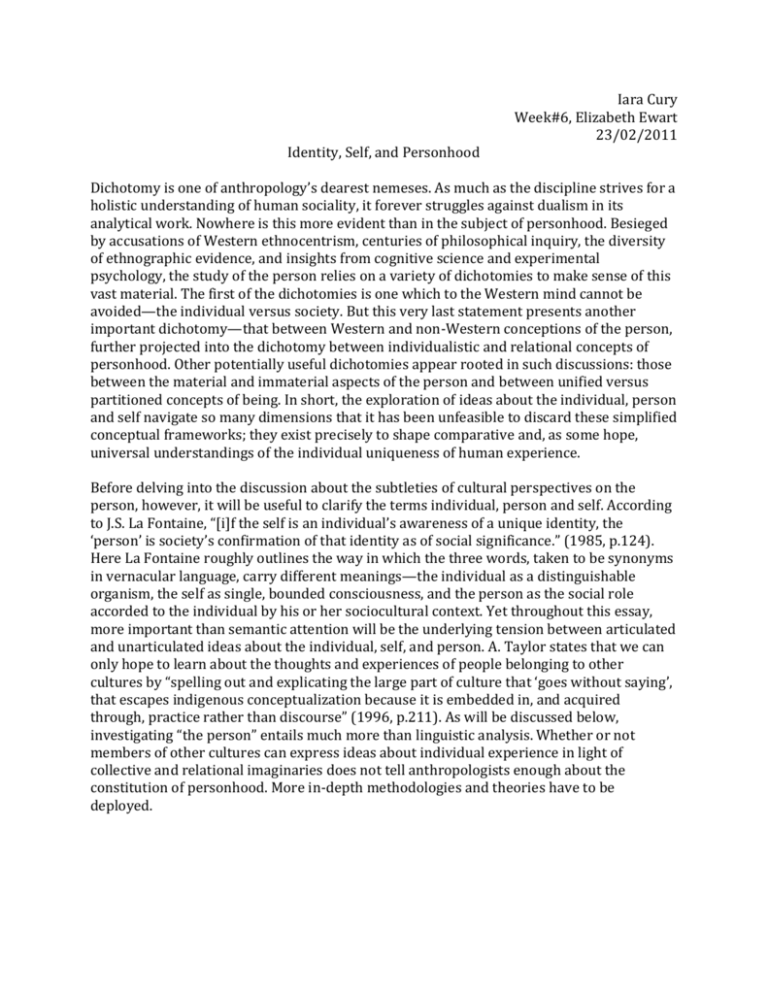
Iara Cury Week#6, Elizabeth Ewart 23/02/2011 Identity, Self, and Personhood Dichotomy is one of anthropology’s dearest nemeses. As much as the discipline strives for a holistic understanding of human sociality, it forever struggles against dualism in its analytical work. Nowhere is this more evident than in the subject of personhood. Besieged by accusations of Western ethnocentrism, centuries of philosophical inquiry, the diversity of ethnographic evidence, and insights from cognitive science and experimental psychology, the study of the person relies on a variety of dichotomies to make sense of this vast material. The first of the dichotomies is one which to the Western mind cannot be avoided—the individual versus society. But this very last statement presents another important dichotomy—that between Western and non-Western conceptions of the person, further projected into the dichotomy between individualistic and relational concepts of personhood. Other potentially useful dichotomies appear rooted in such discussions: those between the material and immaterial aspects of the person and between unified versus partitioned concepts of being. In short, the exploration of ideas about the individual, person and self navigate so many dimensions that it has been unfeasible to discard these simplified conceptual frameworks; they exist precisely to shape comparative and, as some hope, universal understandings of the individual uniqueness of human experience. Before delving into the discussion about the subtleties of cultural perspectives on the person, however, it will be useful to clarify the terms individual, person and self. According to J.S. La Fontaine, “[i]f the self is an individual’s awareness of a unique identity, the ‘person’ is society’s confirmation of that identity as of social significance.” (1985, p.124). Here La Fontaine roughly outlines the way in which the three words, taken to be synonyms in vernacular language, carry different meanings—the individual as a distinguishable organism, the self as single, bounded consciousness, and the person as the social role accorded to the individual by his or her sociocultural context. Yet throughout this essay, more important than semantic attention will be the underlying tension between articulated and unarticulated ideas about the individual, self, and person. A. Taylor states that we can only hope to learn about the thoughts and experiences of people belonging to other cultures by “spelling out and explicating the large part of culture that ‘goes without saying’, that escapes indigenous conceptualization because it is embedded in, and acquired through, practice rather than discourse” (1996, p.211). As will be discussed below, investigating “the person” entails much more than linguistic analysis. Whether or not members of other cultures can express ideas about individual experience in light of collective and relational imaginaries does not tell anthropologists enough about the constitution of personhood. More in-depth methodologies and theories have to be deployed. After Mauss’ seminal article on the different conceptions of the person made explicit the recognition that individualism1 was unique to the Western world, anthropologists began to pose questions about personhood in a broader framework. How does a society conceptualize the person? How does a society conceptualize the self? Do all societies recognize the self? Among the various ethnographic works that sampled the social mechanisms of societies lacking an ideology of individualism, M. Strathern’s book, The Gender of the Gift, is cited as one of the more powerful ones. Proposing that “Melanesian persons are as dividually as they are individually conceived. They contain a generalized sociality within” (1988, p.13), Strathern articulated and theorized the opposite of individualistic personhood—relational personhood. Quite a revolutionary concept applicable to many other cultures around the world, relational personhood took on a life of its own. But the result was the strengthening of the anthropological dichotomy between Western and non-Western forms of personhood, between individual and relational persons, to the point where personhood because a reified polarity of opposites instead of a spectrum of ideas. In the analysis of his ethnography of personhood in Melanesia, E. LiPuma tackles this very problem, the view that Western and Melanesian ideas of personhood were “fully incommensurable” (1998, p.56). For him, “persons emerge precisely from that tension between dividual and individual aspects/relations. And the terms and conditions of this tension…will vary historically” (p.57). In addition to returning Melanesian ideas to the spectrum of personhood, he also notes how the process of modernization depends on a functional understanding of individualism; Melanesians have had to deploy localized notions of what personhood entails to effectively manage different situations (p.72). Overall, LiPuma notes that to compare non-Western notions of personhood to Western ideology, an essentialization of diverse ideas clearly divergent from Western reality, is a recipe for misguided theorizing (p.75). Striking down the façade of incommensurability, LiPuma circumvents traditional academic dichotomies to pose a challenge: grounding the study of personhood on comprehensive ethnographic evidence rather than on ideologies, be they Western or non-Western. On the same track, additional decades of ethnographic work and analysis have led anthropologists to doubt the wisdom of Mauss’ partitioning of social and individual experiences of personhood. The question arises: in societies where the conceptualization of the self is not as strong or missing, does the self still play a part in the constitution and functioning of society? A suggestive answer comes from L. Belaunde’s ethnographic work, descriptive of the attention placed on the feeling and public demonstration of anger by the Airo-Pai of Amazonia, whose notion of personhood would not qualify as individualistic. The first interesting point she raises is that “as elsewhere in Amazonia, upbringing is the cornerstone of personhood and kinship” (2000, p.211). Here the proper transmission of cultural values and social training is held to be invaluable for the constitution of effective 1 Individualism: “notions of the ultimate value and dignity of the human individual, his or her moral and intellectual autonomy, his or her rationality and self-knowledge, spirituality, right to privacy, self-sovereignty and self-development, an d his or her voluntary contracting into a society, market and polity” (Lukes 1990, quoted in Rapport, 2007, p.209). personhood. Furthermore, the statement that “although a person’s anger is caused by others, he or she is responsible for controlling it once it is felt” (p.211) highlights the socially recognized difference between acceptable social behavior and individual conduct. In fact, Belaunde brings to the fore the importance of agency in the imaginary and practice of personhood by writing that the Airo-Pai “stress the moral responsibility of both the one who causes anger in others and the one who becomes angered by others” (p.218). A researcher of another Amazonian group, the Jivaroan Achuar, A. Taylor presents ethnographic evidence to the effect that the experience of self and personhood is both an intensely psychological and thoroughly relational affair. According to her, “one’s inner landscape is shaped by the understanding one has of others’ perceptions of oneself”. Yet in a culture where violence and shifting alliances is “endemic”, the “pervasive uncertainty as to the real nature of others’ feelings for oneself cannot fail to have consequences for…selfhood” (1996, p.207). In this example Taylor touches upon the individual’s experience of his or her social position, where the self’s search for security and stability clashes with the fluidity of social personhood. Both Amazonian examples draw attention to the danger of essentializing notions of personhood in non-Western cultures, especially in terms of negating the close relationship between personal consciousness and the performance of sociality. As F. Poole deftly asserts, “to suppose that representations…of individuality can exist only in conjunction with a highly elaborated, metaphysically complex, ideologically prominent, and institutionally embedded concept of the individual would be unduly restrictive” (2005, p.844). The more we discuss the variety of ideas about personhood the more it seems that anthropology is only beginning to analytically reorganize concepts and processes emerging from recent (and not so recent) contributions from cognitive science and psychology. One particular challenge is to integrate understandings of childhood formation of the self and socialization with later developments of social personhood based on age, maturity, parenthood and achievement. The Durkheimian tradition’s emphasis of the latter cannot discard the course and consequence of the psychological basis—the self—of the person. In his article entitled, “Becoming Persons: Consciousness and Sociality in Human Evolution”, T. Ingold reinterprets relational personhood from a cognitive perspective. For him, “the pattern of a person’s social relationships becomes incorporated into the very structure of his or her perceptual system” (2006, p.189). In other words, exercising cognitive abilities simultaneously exercises social relationships and cultural knowledge; since consciousness and social relations cannot be separated in experience, they should not be dichotomized in theory. As Ingold’s article demonstrates, contemporary “Western” studies of the mind, self, and socialization have insisted on probing what that Mauss eschewed in his time—the connection between individual and society, and the question of which one is primarily constitutive of the other. Discussions of personhood frequently amble into the domain of social responsibility and moral order, as for example in the debate about when personhood begins; these ideas must be taken into account as much as cognitive perspectives. In addition, while the popular Western idea of individual autonomy must be scrupulously examined, anthropologists do well to avoid what Rapport and Overing term “overdetermining” or “overweening” social theories (2007, p.225). Ultimately, it seems (from my interpretation) that anthropological inquiry in many fields is converging on an intricate and indivisible problem—human agency and its relation to social structure. Postulating analytical dualisms have helped anthropologists to explore complex and unbounded problems, but the accumulation of ethnographic evidence, paired with various scientific (not to imply accurate or cohesive) findings, demands the juxtaposition, and optimistically, integration of certain dichotomous strands. Whatever may be said for the dangers of dichotomy, however, it is debatable whether theoretical developments will ever be able to bridge the existential gulf between the “I” and the “Other”. Rapport and Overing’s sober affirmation that “no process of socialization or enculturation” can overcome “the separateness of the individual body and brain” (p.224) sounds like a challenge for the daring anthropologist, but it might be the simple truth. Bibliography Belaunde, L.E. 2000. ‘The convivial self and the fear of anger amongst the Airo-Pai of Amazonian Peru’ in Overing & Passes (eds.) The Anthropology of Love and Anger. London: Routledge Ingold, T. 1991 ‘Becoming persons: consciousness and sociality in human evolution’ Cultural Dynamics vol. 4(3): 355-78 [reprinted in Moore & T. Sanders (eds) Anthropology in Theory Oxford: Blackwell] LaFontaine, J.S., 1985. “Person and individual: some reflections” in The Category of the Person, Carrithers, M., Collins, S., Lukes, S., (eds). Cambridge: CUP. LiPuma, E. 1998. ‘Modernity and forms of personhood in Melanesia’ in Lambek, M. & Strathern, A. Bodies and persons Cambridge: CUP Poole, F.J.P. 2002. “Socialization, enculturation and the development of personal identity” in Companion Encyclopedia of Anthropology, Ingold, T. (ed). London: Routledge. Rapport, N. and J. Overing. 2007. “Invididuality” and “Individualism” in Social and Cultural Anthropology. London: Routledge. Strathern, M. 1988. The Gender of the Gift. Berkley: University of California Press. Taylor, A.C. 1996. The soul's body and its states: an Amazonian perspective on the nature of being human. The Journal of the Royal AnthropologicaI Institute 2, 201-215. Toren, C. 1999. Mind, materiality, history: explorations in Fijian ethnography London: Routledge [reprinted in H. Moore & T. Sanders (eds) Anthropology in Theory Oxford: Blackwell]
